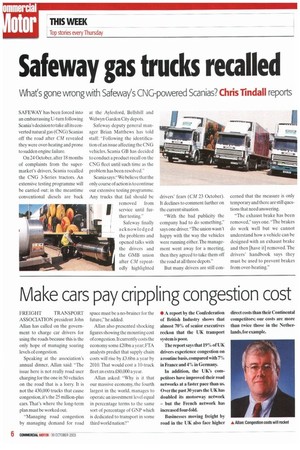Make cars pay crippling congestion cost
Page 6

If you've noticed an error in this article please click here to report it so we can fix it.
FREIGHT TRANSPORT ASSOCIATION president John Allan has called on the government to charge car drivers for using the roads because this is the only hope of managing soaring levels of congestion.
Speaking at the association's annual dinner, Allan said: "The issue here is not really road user charging for the one in 50 vehicles on the road that is a lorry. It is not the 430,000 trucks that cause congestion, it's the 25 million-plus cars. That's where the long-term plan must be worked out.
"Managing road congestion by managing demand for road space must be a no-brainer tor the future," he added.
Allan also presented shocking figures showing the mounting cost of congestion. It currently costs the economy some £20bn a year; FTA analysts predict that supply chain costs will rise by £3.6bn a year by 2010. That would cost a 10-truck fleet an extra £80.000 a year.
Allan asked: "Why is it that our massive economy, the fourth largest in the world, manages to operate an investment level equal in percentage terms to the same sort of percentage of GNP which is dedicated to transport in some third world nation?" • A report hr. ilic Confederation of British Industry shows that almost 70% of senior executives reckon that the UK transport system is poor.
The report says that 19% of UK drivers experience congestion on a routine basis, compared with 7% in France and 4% in Germany.
In addition, the UK's competitors have improved their road networks at a faster pace than us. Over the past 30 years the UK has doubled its motorway network but the French network has increased four-fold.
Businesses moving freight by road in the UK also face higher direct costs than their Continental competitors; our costs are more than twice those in the Netherlands, for example.




























































































































































































